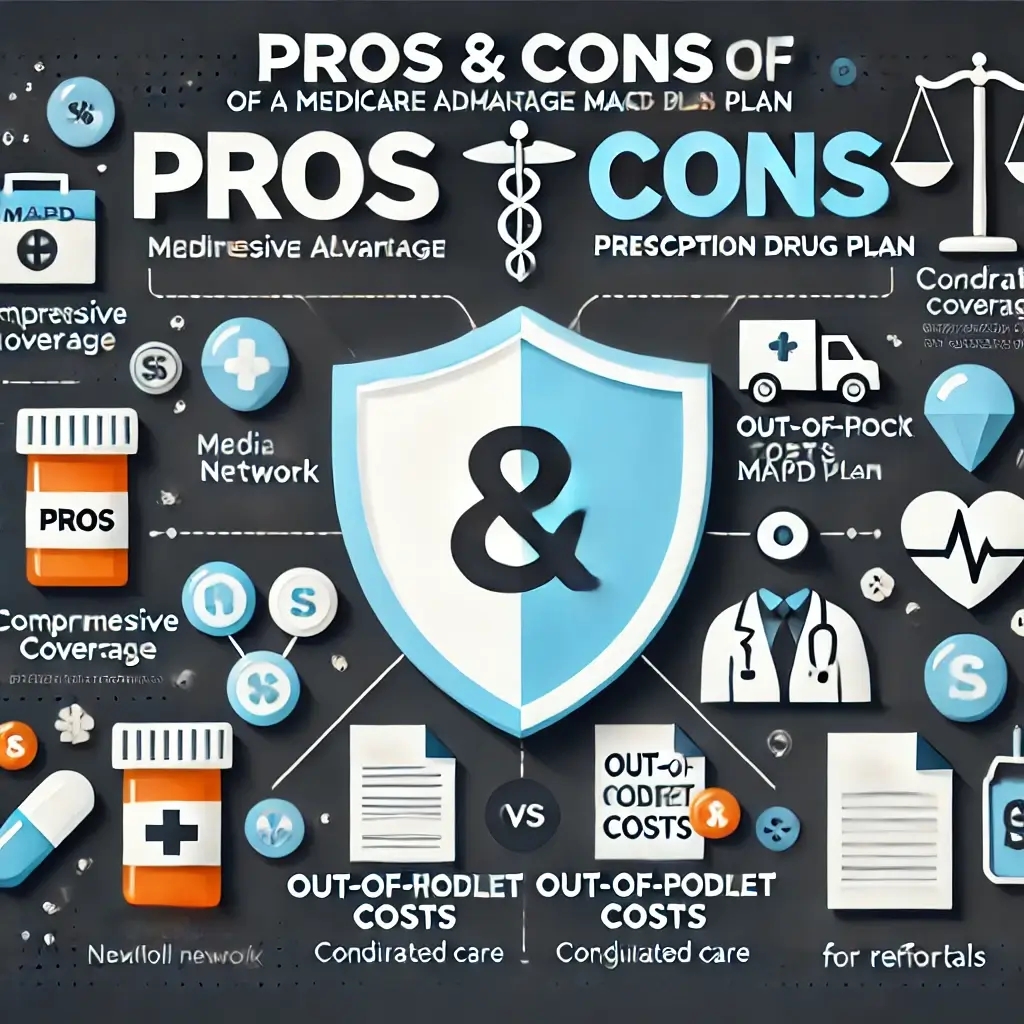Medicare Advantage Prescription Drug (MAPD) plans are a popular option for Medicare beneficiaries seeking comprehensive coverage. These plans combine Medicare Part A (hospital), Part B (medical), and Part D (prescription drug coverage) into one package, often with added benefits like vision, dental, and hearing. While MAPD plans have many advantages, they may not be the best choice for everyone. In this post, we’ll explore the pros and cons of MAPD plans to help you determine if it’s the right fit for your healthcare needs.
Pros of MAPD Plans
- All-in-One Coverage One of the biggest benefits of an MAPD plan is that it bundles Medicare Part A, Part B, and Part D into one convenient plan. This means you won’t have to manage separate plans for your hospital, medical, and prescription drug coverage.
- Lower Premiums MAPD plans often have lower or even $0 premiums compared to Original Medicare with a Medigap supplement. In some cases, the monthly premiums are lower because MAPD plans are subsidized by the government.
- Prescription Drug Coverage Included Unlike Medigap plans, which do not include prescription drug coverage, MAPD plans typically cover prescription medications, making it easier to manage your healthcare expenses in one plan.
- Additional Benefits Many MAPD plans offer extra benefits that Original Medicare doesn’t cover, such as dental, vision, hearing aids, fitness programs, and even wellness benefits like transportation to medical appointments. These perks can enhance your overall health and quality of life.
- Out-of-Pocket Maximum With MAPD plans, there is a limit on how much you have to spend out-of-pocket each year. Once you reach this maximum, the plan covers 100% of your Medicare-covered services for the rest of the year. Original Medicare, on the other hand, does not have an out-of-pocket limit.
- Coordinated Care Many MAPD plans are part of Health Maintenance Organizations (HMOs) or Preferred Provider Organizations (PPOs), which focus on coordinating care. This means your doctors and healthcare providers work together to offer more organized and efficient care, helping to avoid unnecessary tests and procedures.
Cons of MAPD Plans
- Limited Provider Networks MAPD plans often require you to use a specific network of doctors, hospitals, and pharmacies. If your preferred healthcare providers are not part of the plan’s network, you may have to pay more for care or switch to in-network providers. This can be restrictive, especially if you travel frequently or have a long-standing relationship with your healthcare providers.
- Referrals and Pre-Authorizations Many MAPD plans require referrals from your primary care doctor to see specialists and pre-authorizations for certain treatments or procedures. This can add an extra layer of complexity and delay to your healthcare, especially if you need specialized or urgent care.
- Out-of-Pocket Costs While MAPD plans often have lower premiums, you may face higher out-of-pocket costs when you use services. Co-pays, deductibles, and co-insurance can add up, particularly if you need frequent medical care or use out-of-network providers.
- Plan Variability MAPD plans vary significantly by location and provider, which means the benefits and costs of one plan can differ from another, even within the same city or region. This can make it difficult to compare plans and find the right fit for your needs.
- Annual Plan Changes MAPD plans are subject to change each year. The network of providers, benefits, and out-of-pocket costs can be adjusted annually. It’s important to review your plan during the Medicare open enrollment period to ensure it still meets your needs.
- No Nationwide Coverage Unlike Medigap plans, which provide coverage across the United States, MAPD plans often limit you to a local network of providers. If you travel frequently or split your time between different states, you may have limited access to healthcare services outside of your plan’s network.
Is an MAPD Plan Right for You?
MAPD plans can offer a convenient, cost-effective way to get comprehensive coverage, especially for those who are comfortable with network-based care and enjoy the additional benefits offered by these plans. However, if you prioritize flexibility in choosing healthcare providers, travel frequently, or want to avoid out-of-pocket costs for specialized care, a Medigap plan might be a better fit.
Ultimately, the decision depends on your healthcare needs, budget, and personal preferences. Be sure to compare MAPD plans in your area carefully and review all the details before making your choice.


